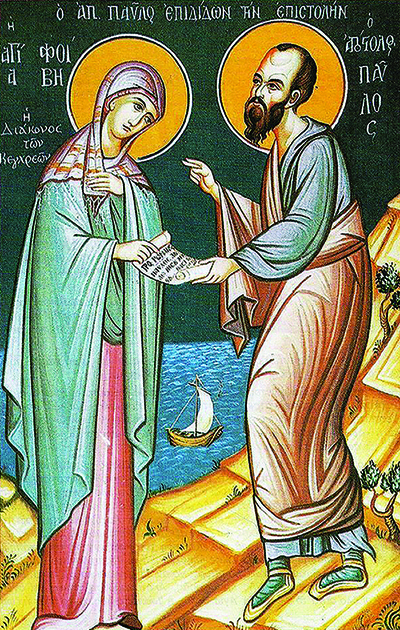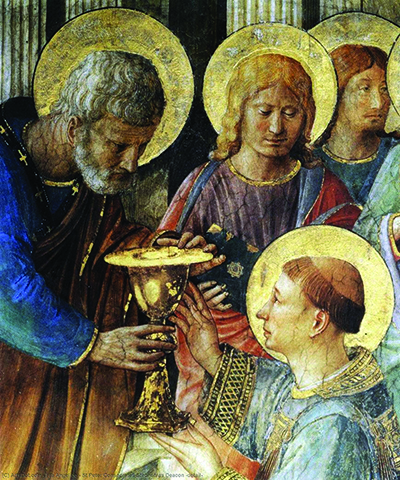Deacons in the Church: Vibrant Servants of God

St. Phoebe the Deacon being given St. Paul’s epistle to deliver to Rome: Orthodox icon.
by Jennifer Frim
Deacon. It’s a word that you might have heard from time to time, tossed around in various church contexts—maybe even in church contexts beyond our Lutheran one. What exactly does it mean and how is it used in our church? The term comes from the Greek word diakonos, which, in its simplest form means “servant” or “assistant.”
In the New Testament this word is used in many different ways. In 1 Corinthians 6:4, Paul calls both himself and Timothy “servants of God.” In Romans 16:1, Phoebe is called a “servant of the church in Cenchreae.” In Philippians 1:1, Paul uses the word when he greets the members of the church at Philippi along with its “overseers and deacons.” In 1 Timothy 3, there is an extensive list of qualifications for overseers and deacons which Paul gives to Timothy as a guide for selecting leaders for the congregation in Ephesus.
Though the word has a wide range of meaning, one of its uses seems to point to those who serve as assistants in the church. This is the way it seems to be used in Romans 16:1, Philippians 1:1, and 1 Timothy 3. Throughout history, the term has been used in this way to describe people who served and assisted in the church in many different ways. Deacons were at one time assistants to the bishops. Women deacons, or “deaconesses,” served women and acted as nurses.
At the national convention in 1999, Lutheran Church–Canada (LCC) officially established an office of deacon within our church body. This office is considered an “auxiliary” or “helping” office. C.F.W. Walther spoke of the preaching office (held by the pastor) as the highest office in the church from which all other offices—including the helping office of deacon—flow. With this understanding, deacons assist the pastor in aspects of his work—not in preaching or administering the sacraments, but in many other ways, including visitation, music, youth and children’s ministry, leading Bible studies, teaching in Lutheran schools, and the like.
Prior to 1999, individuals doing this work served in LCC congregations and schools but were not collected under one official “category.” Instead, there were several different groups of individuals who had varying levels of training for their tasks. These included Directors of Christian Education, Directors of Parish Services, Directors of Christian Outreach, Youth Staffers, Parish Assistants, Deaconesses, and Lutheran Teachers. There were also gifted lay people without official training serving congregations and schools.

St. Peter consecrates St. Stephen as a deacon, detail: Fra Angelico, c. 1450.
The establishment of an overarching office of deacon brought all individuals with recognized training under one umbrella-office of deacon. Within this office there are still several sub-categories, but the overarching designation of “deacon” helped to facilitate the participation of these individuals in the greater life of the synod. It also lent a greater level of recognition and credence to the important work they do alongside the pastors of our church.
Today deacons are permitted to speak and attend conventions as advisory delegates, and there are positions reserved for them on many of our synodical boards and commissions. These deacons are an important part of our church and support pastors, congregations, schools, and the greater church in spreading the Gospel and making disciples.
Deacons in LCC can be men or women, and the term “deacon” as it is used in LCC is meant to denote both genders. Both men and women are well-represented on our deacons’ roster. There is no need to address female deacons as “deaconesses” in order to differentiate or be inclusive. In fact, the term “deaconess” refers only to a specific sub-category of deacons. Women with this designation have undergone specific training within our sister church The Lutheran Church–Missouri Synod, which equips them for works of mercy, spiritual care, and teaching the faith. They serve congregations, but also in nursing homes, hospitals, and the foreign mission field. Not all women who are deacons in LCC are actually “deaconesses” in this sense. In fact, this designation refers to very few individuals. Most deaconesses remain in the LCMS for service. When referring to deacons in LCC, it is best to simply use the term “deacon.”
Deacons in LCC are a small but vibrant group. They serve in many capacities within congregations and schools, and share the love of Jesus in a wide range of settings. Deacons have a deep love for their Saviour, a heart for sharing the gospel, and a desire to serve their Lord and the church in making disciples of all nations. The role of the deacon is diverse! No two deacons serve in exactly the same way.
Deacons in LCC are a small but vibrant group. They serve in many capacities within congregations and schools, and share the love of Jesus in a wide range of settings.
Those who serve as deacons in congregations (such as Directors of Parish Services) provide important support to congregations and pastors. These individuals facilitate and teach alongside the pastor in congregational programs such as Sunday school, youth group, confirmation, and midweek programs. They also can assist the pastor in visitation and other aspects of spiritual care as their gifts allow. Some deacons also assist with congregational music. Having a deacon in a congregation allows the pastor to spend more time focused on aspects of ministry which are unique to his call while the deacon supports the congregation in other areas. Since every congregation has different needs, every deacon serves in a unique way.
Up until the spring of 2015, many LCC deacons who received their training in Canada were certified for service as deacons through training programs offered at Concordia University of Edmonton. The discontinuation of those programs in 2015 left LCC without Canadian programs dedicated to training Directors of Parish Services or Lutheran Teachers. Since that time Concordia Lutheran Seminary (CLS) in Edmonton has been exploring avenues through which they might offer a training program for Directors of Parish Services. With the blessing of their Board of Regents and with the agreement of the synodical Board of Directors to accept graduates of the program into the diaconate, CLS is now ready to launch its program and accept applications from men and women for admission to its Graduate Diploma in Parish Services (GDPS).
The CLS program is different than LCC’s previous diaconal training programs in that it is a graduate-level program. This means that applicants must normally hold a bachelor’s degree or its equivalent. The degree can be in any subject area and biblical languages are not required. GDPS students also must enter the program with a solid foundation of biblical and theological knowledge. CLS will work with those applicants who do not have the needed foundations to help them achieve the background they need in order to succeed in the program. The program itself consists of two years of study: one year in the classroom and one year of internship with a final culminating course late in the internship year. The year of coursework will partially focus on building greater biblical and theological knowledge, but also will have a strong practical component. This means that many courses will focus on the practical application of biblical and theological knowledge in a parish setting. Students will participate in field education, and classes on Scripture, theology, teaching the faith across the lifespan, spiritual care, counseling, evangelism, and diaconal studies. This intense but robust program is designed to train quality deacons to serve the church into the future.
If you think God might be calling you or someone you know to serve as a deacon in LCC and you would like more information about the GDPS program, please contact CLS at jfrim@concordiasem.ab.ca.
———————
Dcn. Dr. Jennifer Frim is Diaconal Ministries Coordinator at Concordia Lutheran Seminary (Edmonton).




